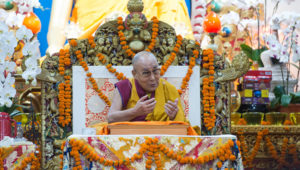
His Holiness the Dalai Lama speaking on the final day of his teaching for SE Asians at the Tsuglagkhang in Dharamsala, HP, India on September 1, 2017. Photo by Tenzin Choejor/OHHDL
Thekchen Chöling, Dharamsala, HP, India – His Holiness the Dalai Lama’s throne and the pillars of the Tsuglagkhang were decorated with garlands of marigolds today in celebration of his conducting a ceremony to generate the awakening mind of bodhichitta. Once His Holiness had arrived and taken his seat, a small group of laypeople sitting before him recited the ‘Heart of Wisdom Sutra’, for the first time in this temple, in Indonesian. The Sutra was then recited again in graceful English by a single Singaporean nun.
As is his custom, His Holiness, chanting in Tibetan, repeated the ‘Praise for the Perfection Wisdom’, the verse of homage from ‘Ornament for Clear Realizations’, and the verse of salutation from Nagarjuna’s ‘Fundamental Wisdom’:
I prostrate to the perfect Buddha,
The best of all teachers, who taught that
That which is a dependent origination is
Without cessation, without arising;
Without annihilation, without permanence;
Without coming; without going;
Without distinction, without identity
And peaceful—free from fabrications.
“Today is the last day of our teachings on this occasion,” His Holiness declared, “and we’ll be mainly concerned with the bodhichitta ceremony.
“The purpose of the Dharma—and of all religious teaching—is to find happiness. Both happiness and unhappiness have their roots in our minds. And just as we need to observe physical hygiene to stay well, we need to understand the workings of the mind and maintain emotional hygiene if we want to be happy.
“Maitreya said the practice that closes off the lower realms of existence is bodhichitta. Harming others is the cause of birth in such realms and when we have bodhichitta we restrain ourselves. Whereas Hearers avoid disturbing emotions and their results in order to reach the peace of nirvana, Bodhisattvas aim for enlightenment for the sake of all sentient beings. They cultivate wisdom understanding reality and the nature of things and take responsibility for accomplishing the welfare of others.”
His Holiness quoted a verse from Shantideva’s ‘Guide to the Bodhisattva’s Way of Life’:
If I do not actually exchange my happiness
For the, sufferings of others,
I shall not attain the state of Buddhahood
And even in cyclic existence shall have no joy.
“Driven by extreme self-centred attitudes we’re dogged by misfortune, including birth in the lower realms of existence. On the other hand cultivating the awakening mind of bodhichitta brings about temporary and ultimate happiness. Nevertheless, warm-heartedness brings benefit whether we are religious or not. In his ‘Song of Experience’ Je Tsongkhapa described bodhichitta like this:
“Generating the mind (of bodhichitta) is the central axis of the path of the supreme vehicle;
It’s the foundation and the support of all expansive deeds;
In all instances of the two accumulations it is like a golden elixir;
It is a treasury of merit containing myriad collections of virtues;
Recognizing these truths the heroic bodhisattvas
Uphold this precious supreme mind as the heart of their practice.
I, a yogi, have practised in this way;
You, who aspire for liberation, should do likewise.”
His Holiness remarked that while those who exploit, cheat and bully others are uneasy, the warm-hearted have good health and live in peace. He noted that bodhichitta must be complemented by an understanding of emptiness and that it is important to actually develop them within ourselves.
In his ‘Precious Garland’, Nagarjuna outlines practices that give rise to high status, or good rebirth, and definite goodness, or enlightenment. Buddhahood is not easily attained in one life; it requires practice, step by step over an extensive period of time. Nagarjuna lays out what to do:
Not killing, not stealing,
Forsaking the mates of others,
Refraining completely from false,
Divisive, harsh, and senseless speech,
Thoroughly forsaking covetousness, harmful intent,
And the views of Nihilists—
These are the ten gleaming paths of action;
Their opposites are dark.
Not drinking intoxicants, a good livelihood,
Non-harming, respectful giving,
Honouring the honourable, and love—
Practice in brief is that.
His Holiness repeated that the way to make life meaningful is to develop a warm heart. He observed that when a doctor recommends we relax and take things easy, they don’t mean we should just be physically relaxed—they mean that our minds should be at ease as well.
“All religious traditions value and commend warm-heartedness,” he remarked. “Even animals respond to displays of genuine affection. Whatever work you do you can use it to help others—and both they and you will benefit. The point is to cultivate warm-heartedness on a daily basis”
His Holiness then conducted a formal rite for generating the awakening mind of bodhichitta. It was briefly interrupted when a member of the audience had an epileptic seizure. Two physicians attended him and he was soon fully recovered.
As the session came to a close, arrangements were made for all 1500 members of the Asian Buddhists to gather in smaller groups around His Holiness, who remained seated on the throne, to have their photographs taken with him. He remarked that he had wondered whether he might be able to read the seventh chapter of Buddhapalita’s treatise, but time had run out. “We’ll continue to read it in the coming years,” he said. https://www.dalailama.com/news/2017/final-day-of-buddhapalita-teachings-for-se-asians